Last Updated on April 11, 2025
Social search is a trend that foreign brands can’t overlook, especially for a consumer market as digitally engaged as China. Among the country’s dynamic Chinese social media platforms, WeChat stands out for its in-app search functions that allow broad content discovery.
Unlike traditional search engines, WeChat Search operates with an algorithm targeting the content published within its ecosystem. This includes official accounts, mini-programs, e-stores, articles, videos, and many more.
Read along as we explain how your brand can benefit from a reliable WeChat SEO strategy and help you understand how local search patterns work on Chinese social media platforms.
What Is The WeChat Search?
The WeChat Search (搜一搜) is a feature integrated within the app launched in 2017. It allows users to find information or content related to the keyword they’re looking for.
This in-app function focuses on articles, accounts (official and unofficial WeChat ID), mini-programs, virtual storefronts, and product listings created within the platform’s ecosystem. These dynamic search results make WeChat Search a critical marketing channel for businesses targeting Chinese consumers.
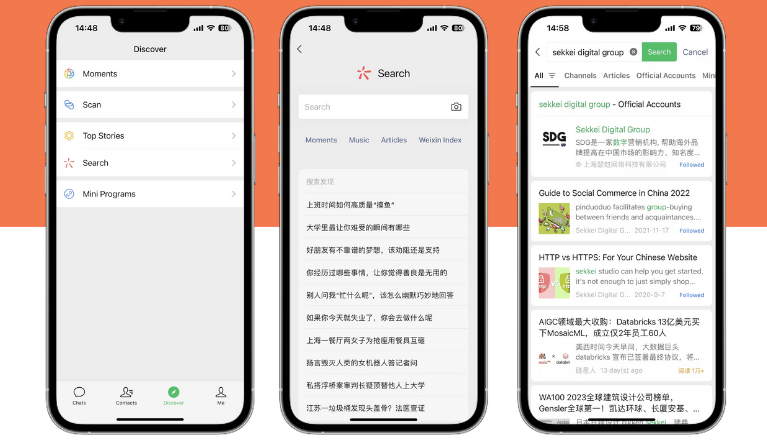
The WeChat app search box used to be hidden in the platform’s interface. However, as the years passed, this feature became more prominent. In fact, the search icon can now be seen on top of the screen in almost all of its major landing pages.
Consumer Profile of WeChat Search
This WeChat app feature plays a significant role in the local search market, especially with its 800 million monthly active users. If you think about it, that’s approximately 72.73% of Badu’s (China’s biggest search engine) overall consumer base.
Reports also suggest that around 50% of WeChat users engage with and browse content through the platform’s search screen daily. Local internet users are also increasingly searching for long-tail keywords on social media platforms, which is a notable shift in their digital consumption patterns.
This change mainly stems from the growing preference of Chinese consumers for content-based platforms over traditional search engines. On top of that, users are also diversifying their search patterns by using more than one platform when looking for information online. These multi-channel preferences often include a combination of social media platform options, online marketplaces, and search engines.
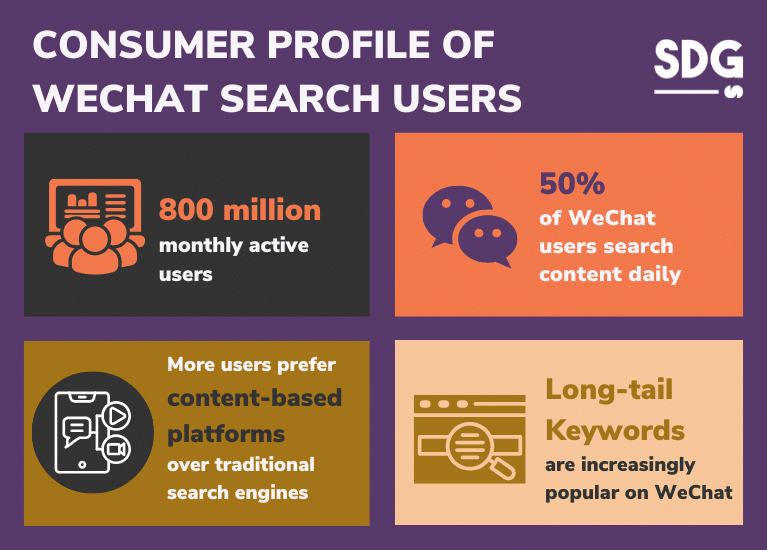
Is WeChat Search integrated into Sogou?
Simply put, Sogou is the search engine technology that powers Tencent products like WeChat’s in-app search function.
Sogou’s web-based platform and mobile app (popularly known as “Sogou Weixin search”) prioritize WeChat-related content. This algorithm and raking factor allow non-WeChat users to access content published on the platform, such as articles, mini-programs, official accounts, and videos.
How Does WeChat Search Work?
The WeChat Search engine consolidates published content from across the platform’s extensive ecosystem (and selected outside sources) into a unified results page for the user. When a user enters a query, the engine pulls relevant results from various categories, such as social posts, official content, mini-programs, and web pages, via its partner engine.
The results are typically organized by type, and users can utilize the app’s filtered search function. This allows them to scroll through different content categories faster (e.g., focusing only on articles, videos, mini-programs, etc.).
What types of content are discoverable on WeChat Search?
A key aspect of the WeChat Search engine is the varying content types it can retrieve. Rather than just web links, it displays many kinds of in-app content. Here are the main types of content discoverable through this feature:

- Text-based Content
Users searching for articles, news, and other content published on WeChat can use the app’s filtered search to get the results they’re looking for. Because of this, brands must optimize their content with relevant keywords to ensure that it appears in a specific search result.
- Official WeChat Accounts
This section shows WeChat user IDs related to the keyword you entered on the search bar. It’s not the place to find friends. Instead, the search results page lists official accounts registered on the platform.
This is why your brand account needs to be optimized with proper WeChat ID names, which will help users discover your profile when using the platform’s search feature.
For example, if someone searches for a brand name or person’s name, the official WeChat account (if one exists) may be one of the top results.
- Mini-Programs
Mini-programs (lightweight apps within WeChat) are indexed within the platform’s search function. Users can discover mini-programs by name or related keywords.
Results might show a mini-program’s landing page or a specific functional page within a mini-program. For instance, searching for a restaurant might surface a mini-program for making reservations, or a query about language learning might show a mini-program app for studying.
- WeChat Channel
If a query matches popular videos or hashtags on WeChat Channels, those video posts will appear (often under a “Videos” or “Channels” tab in the results).
For example, a user searching for a brand or product might see short review videos or promotional clips posted on a Channels account. This is because WeChat Channels is a public traffic source, unlike Moments.
- Products and Services (WeChat Stores)
If the query entered on the search bar is related to a product or service, the results can include product listings from WeChat’s e-commerce features (often via mini-program stores or the WeChat Store).
This is extremely useful for consumers looking for specific products or deals. It’s also a good way for businesses to gain traffic and sales conversions through organic searches.
How Are Search Results Displayed on WeChat and Sogou?
If you look at the screenshots we provided below, you’ll notice that WeChat article search results on Sogou Weixin offer a more comprehensive search result. It includes the article’s title, a summary of the piece, the cover image associated with the post, the name of the public account that published it, the number of reads it has received, and the publication date.
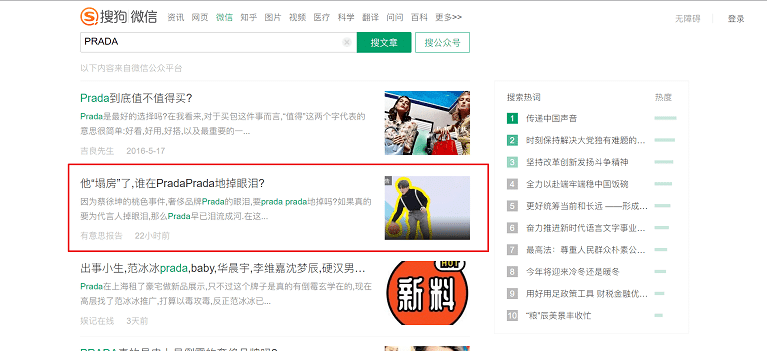
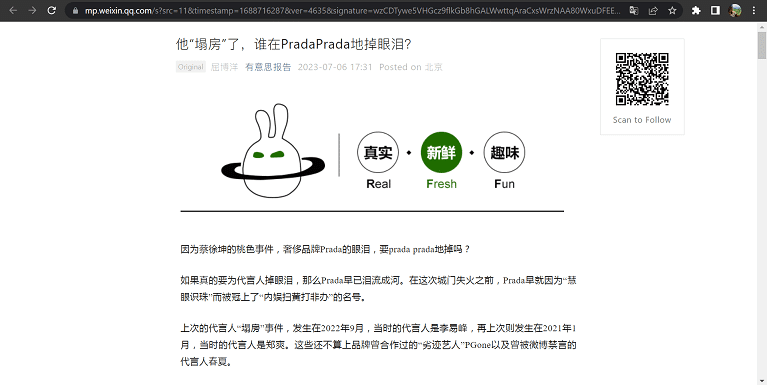
Screenshots of an article search query on Sogou Weixin
In contrast, you’ll see that the search results for specific subscription accounts will return a QR code. In today’s day and age, the QR code is a convenient way for users to access the existing WeChat profile associated with the subscription account they’re searching for. They can scan it to access the business channel directly on the platform.
Typically, the summary in the WeChat articles or other content serves as meta descriptions that appear as a preview in the search engine whenever a user searches for a specific keyword. However, Sogou Weixin’s algorithm often selects random content from within the articles instead of the summary provided in each post.
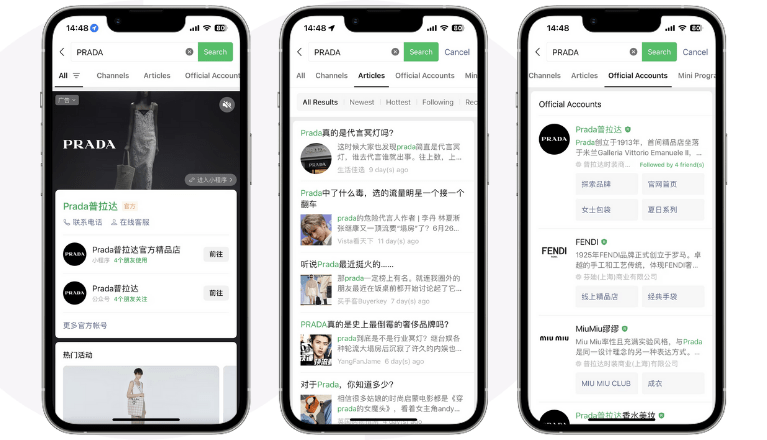
WeChat Search Results
Apart from content prioritization, the search results from the WeChat search and Sogou counterparts have the same formats. The only difference is the absence of the number of reads for each article.
How Are WeChat Search Results Ranked?
Admit it or not, every search engine available to the public has an ever-evolving algorithm. More often than not, these updates come without any warning and are developed further in complete secrecy. Because of this, it isn’t very reasonable to think we have all the answers to your questions about the upcoming updates on WeChat search engine features.
Nevertheless, our experience working with Sogou and WeChat, as well as data compiled by admin5.com, led us to believe that search results (within WeChat or Sogou) are ranked based on four major factors:
- Authority: As discussed earlier, the authority of WeChat official accounts depends on their verification level. The platform offers different verification types, and they carry different weights. However, the most influential verification you can get is “WeChat verification.”
- Relevance: Your content will rank if it is relevant to user search queries, public account names, account summaries, and the summaries of WeChat articles.
- Popularity: Whether you’re trying to rank in the WeChat search engine or other platforms, you must remember that content or articles with the most number of reads, forwards, and reposts will consistently rank higher.
- Frequency: Official account or not, the algorithm within any search engine will favor websites that publish new content more frequently than others.

The ranking factors in Sogou Weixin and WeChat searches resemble those employed by Google. In both cases, recent and relevant content from authoritative sources holds significant importance.
However, the objectives and metrics differ slightly: rather than pursuing backlinks and site visitors, WeChat SEO focuses on generating more reads and acquiring account verifications. Although article size and the use of images may also play a role in improving WeChat SEO, your strategy must focus on enhancing the relevance, popularity, and frequency of your posts and ensuring proper account verification.
Top WeChat Search Engine Features To Utilize
WeChat Brand Zone Search
Besides the app’s different search engine features, the WeChat brand zone is a convenient hub for verified brands, especially because it gives its user base direct access to essential business information. Besides existing accounts, this feature includes setting up e-stores within WeChat, crafting personalized content, and streamlining brand visibility.
Brands can manage traffic within the WeChat brand zone, guiding visitors from one section to another. This provides enough exposure to entice users to follow their official accounts.

WeChat Index Search
WeChat Index (“微信指数”) is a powerful tool that gauges the popularity of specific keywords based on their search volume within WeChat. Since it utilizes big data analysis, mobile indexing, and exposure of WeChat articles, brands can count on it to provide accurate insights.
The platform has no dedicated search bar or menu for the WeChat index, but you can either search for “微信指数” to locate the app and then enter the desired brand term to view the trend or directly input “微信指数 + Keyword” to obtain instant results.
By leveraging the WeChat Index, brands can uncover the most popular searches on WeChat. This valuable information allows them to adjust their marketing strategies and better understand their target audience.
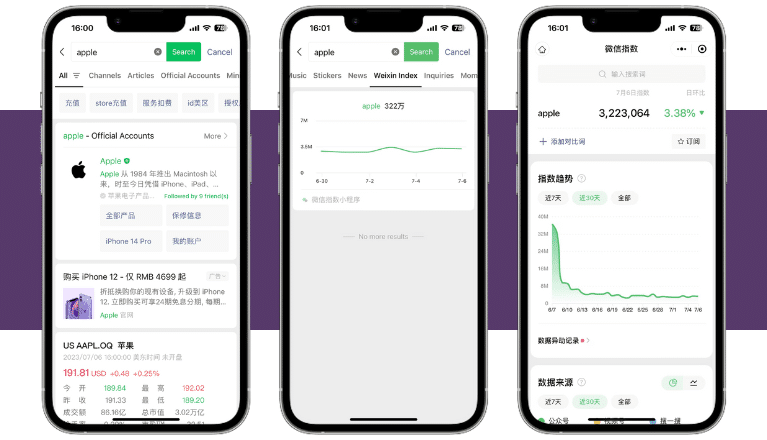
WeChat Mini Program Search Optimization
Unlike other messaging apps, this platform includes WeChat mini-programs that the entire user base can discover through keyword research. Brands can submit up to 10 keywords per mini-program to help their target audience access their content more easily.
Remember that the ranking algorithm for WeChat mini-programs is determined through keyword relevance, program quality, and user engagement. You can also monitor keyword performance and make adjustments up to three times per month.

Search Integration with JD
Some may not know, but WeChat has an integrated e-commerce function enabling users to shop directly on JD.com, China’s second-largest e-commerce platform. This feature allows potential customers to instantly access top products from JD when they enter consumer product keywords in the WeChat search box or discover tab.
The integration of search and shopping within WeChat presents significant market potential. By incorporating value-added services, brands can foster strong customer loyalty and gain a competitive edge.

Quick Q&A
How To Use WeChat Search/SEO To Increase Your Brand Visibility?
Optimizing your brand’s content with relevant keywords that align with your brand and target audience is an effective way to enhance visibility. We suggest conducting thorough keyword research to identify the most appropriate terms for your campaign.
From there, incorporate these keywords in article titles, descriptions, and tags to increase your content’s likelihood of appearing in WeChat search results. You should also create high-quality, engaging content that resonates with your audience to attract more readers.
How do I search for keywords on WeChat?
You can use the search function within the WeChat app to search for keywords on WeChat. Open the app and locate the search box at the top of the main screen.
Enter the desired keyword or phrase related to your topic or industry, and WeChat will display search results that include relevant articles, public accounts, mini-programs, and other related content.
You can explore these search results to find valuable insights, discover popular content, and identify trends within your niche.
What Does The Future Hold For WeChat Search?
WeChat has plenty of data to draw from, so building a superior search engine isn’t too farfetched for the platform. With 1.38 billion registered monthly users, WeChat has more user data than Baidu or Google.
The app knows where users are, what they like and buy, and more. And it’s apparent that the engagement rate within the platform won’t decrease any time soon because an average WeChat user spends over 75 minutes daily on the app.
If you haven’t already done so, now is the time to take advantage of WeChat’s search functions and maximize your brand’s potential.
Your Trusted Digital Marketing Partner in the Chinese Market!
WeChat Search accommodates multiple content formats. To leverage it, brands should ensure they have a presence in as many of these categories as appropriate. For instance, maintaining an active Official Account (for article content), offering a Mini Program or WeChat Store, or producing video content for Channels.
You may also want to read:
Don’t let the complexities of the Chinese market hold you back! Our team is here to guide you through every twist and turn, transforming your brand’s potential into a resounding success.

Whether it’s crafting compelling marketing campaigns or harnessing the power of WeChat SEO, we have the digital solutions you need. Contact us today, and let the world witness your brand’s remarkable growth in China’s thriving business landscape.


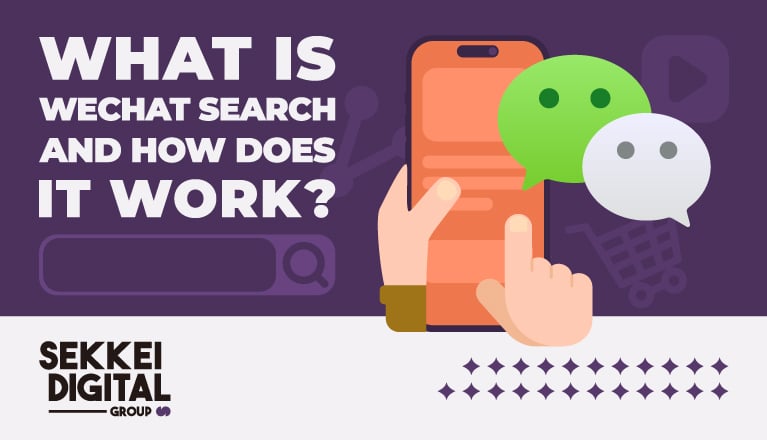

This is pretty damn sweet. I’ve always been a super nerd when it comes to different search engines and how they work under the hood. I remember when I first discovered the major differences in algorithms between Google and Bing. Bing prefers exact match domains and authority going to the sites that rank and Google’s algorithm is pretty much ever changing but for now they’re looking for anchor diversity, traffic, social interaction and authority. I’m looking forward to learning more about this new search engine!